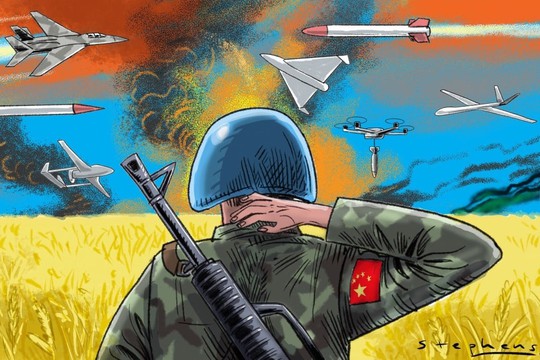Pic.: SCMP
Beijing’s strategic instinct is against military involvement even as its peacekeeping is bound to the UN framework and thus subject to Russia’s veto, notes ‘The South China Morning Post’.
One alternative appearing in the global discussions to fill that trust gap is to deploy peacekeepers to safeguard a ceasefire. But Russia categorically rejects the idea of European/NATO peacekeepers, arguing their presence would escalate tensions instead.
Meanwhile, Washington has proposed that non-European nations – such as Brazil or China – could contribute troops to a peacekeeping mission. This raises an important question: would China, which has sought to position itself as a neutral mediator, send peacekeepers to Ukraine?
Despite Beijing’s diplomatic engagement, the answer is almost certainly ‘No’. China’s participation in peacekeeping has always been tied to the UN Security Council. And Russia, as a permanent council member with veto power, is unlikely to approve any UN-led mission it perceives as unfavourable.
Given Russia’s rejection of European peacekeepers and preference for controlling the situation on its terms, a peacekeeping initiative involving China would face a significant diplomatic hurdle. Without a UN mandate, China would lack the legal framework and justification it typically requires to send troops abroad.
Moreover, China’s strategic calculations make its involvement in Ukraine’s post-conflict security landscape highly improbable. Beijing has carefully navigated the war, maintaining a delicate balance between its relationships with Russia, Ukraine and the broader European community.
Sending peacekeepers to Ukraine would risk alienating Moscow, which Beijing considers a crucial geopolitical partner against Western influence. For China, the costs of deploying troops far outweigh any diplomatic benefits.
China’s historical approach to peacekeeping reinforces its reluctance to engage in Ukraine. While China is the largest contributor of peacekeeping troops among the five permanent Security Council members, its deployments have been concentrated in Africa and the Middle East – where China has extensive economic interests but fewer direct political entanglements.
In contrast, the Ukraine war is deeply intertwined with China’s strategic positioning in Eurasia. Any involvement, even under a peacekeeping mandate, would risk drawing China into the broader geopolitical struggle between Russia and the West – something Beijing has sought to avoid at all costs.
Beijing’s diplomatic initiatives so far concerning the conflict has been on mediation. In 2023, China proposed a 12-point peace plan that emphasised dialogue and negotiation. It was largely dismissed by Western nations as vague and lacking concrete steps. Subsequently, China proposed a six-point peace plan with Brazil, positioning itself as a voice for the Global South in international conflict resolution.
Even from a military logistics perspective, a Chinese peacekeeping deployment to Ukraine would present substantial challenges. China’s peacekeeping forces are well-trained for UN missions but have limited experience operating in active conflict zones in Europe. The complexity of the Ukraine war – marked by shifting front lines, proxy involvement and deep-seated animosities – would make any peacekeeping mission particularly difficult to manage.
Unlike the relatively stable operations in African nations such as South Sudan or the Democratic Republic of Congo, a mission in Ukraine would involve much more risk and political sensitivity.
The broader geopolitical implications of a Chinese military presence in Ukraine also cannot be ignored. The US and its allies are likely to view a Chinese peacekeeping deployment with suspicion, interpreting it as an attempt by Beijing to expand its influence in Eastern Europe.
China’s reluctance to send peacekeepers does not mean it will disengage from the Ukraine conflict. Instead, Beijing is likely to continue advocating for a political resolution while leveraging its economic ties with both Russia and Ukraine.
Ultimately, while the idea of Chinese peacekeepers in Ukraine might appeal to some as a way to bring balance to a potential post-war settlement, it is highly unlikely to materialise. Furthermore, Beijing’s strategic priorities – maintaining stable relations with Moscow, avoiding direct entanglement in European conflicts and positioning itself as a neutral mediator – strongly discourage military involvement.
read more in our Telegram-channel https://t.me/The_International_Affairs

 9:09 04.04.2025 •
9:09 04.04.2025 •























